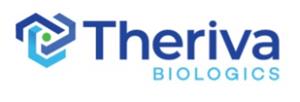
Theriva Biologics Announces First Patient Dosed in Second Cohort of Phase 1b/2a Clinical Trial of SYN-004 (ribaxamase) in Allogeneic Hematopoietic Cell Transplant Recipients
Initiation of Cohort 2 Follows a Positive Review of Safety and Pharmacokinetic (PK) Data from Cohort 1 by an Independent Data and Safety Monitoring Committee
Cohort 2 Patient Dosing Highlights Momentum Across the Theriva Oncology-Focused Clinical Pipeline
ROCKVILLE, Md., Nov. 03, 2022 (GLOBE NEWSWIRE) — Theriva Biologics (NYSE American: TOVX), (“Theriva” or the “Company”), a diversified clinical-stage company developing therapeutics designed to treat cancer and related diseases in areas of high unmet need, today announced the first patient has been dosed in Cohort 2 of its Phase 1b/2a randomized, double-blinded, placebo-controlled clinical trial of SYN-004 (ribaxamase) in allogeneic hematopoietic cell transplant (HCT) recipients for the prevention of acute graft-versus-host-disease (aGVHD).
“We are encouraged by the growing evidence that demonstrates SYN-004 has the potential to reduce serious adverse events in patients undergoing allogeneic HCT to treat hematologic cancers, and are pleased with the program’s continued clinical advancement as part of our oncology-focused pipeline,” said Steven A. Shallcross, Chief Executive Officer of Theriva Biologics. “We are very grateful for the tremendous support from Dr. Dubberke and his team at Washington University as we continue our progress towards improving treatment outcomes for these highly susceptible patients by overcoming existing limitations of broad-spectrum IV beta-lactam antibiotics.”
About the Phase 1b/2a Clinical Trial
The ongoing randomized, double-blinded, placebo-controlled Phase 1b/2a clinical trial is being conducted at Washington University School of Medicine in St. Louis. The trial is designed to evaluate the safety, tolerability, and potential absorption of oral SYN-004 (150 mg q.i.d. for a maximum of 28 days) into the systemic circulation of allogeneic HCT recipients who receive an IV antibiotic to treat fever. To mitigate risk, Cohort 1 of the study administered meropenem as the study-assigned antibiotic. Meropenem is a carbapenem antibiotic that is not metabolized by SYN-004. Patients in Cohorts 2 and 3 will be administered piperacillin/tazobactam and cefepime respectively, each of which can be metabolized by SYN-004. The trial is also designed to evaluate potential protective effects of SYN-004 on the gut microbiome as well as generate preliminary information on potential therapeutic benefits and patient outcomes of SYN-004 in allogeneic HCT recipients. The trial is expected to enroll up to 36 participants with three sequential cohorts, each evaluating a different study-assigned IV beta-lactam antibiotic. Safety and pharmacokinetic data for each cohort will be reviewed by an independent Data and Safety Monitoring Committee that will make a recommendation on whether to proceed to the next IV beta-lactam antibiotic. More information on the study is available here (NCT04692181).
About SYN-004 (ribaxamase)
SYN-004 (ribaxamase) is an oral prophylactic therapy designed to degrade certain IV beta-lactam antibiotics within the GI tract, thereby preventing antibiotic-mediated damage to the gut microbiome and reducing adverse outcomes associated with antibiotic-mediated gut dysbiosis. A previously completed placebo-controlled Phase 2b clinical trial of 412 patients treated with the IV β-latcam antibiotic ceftriaxone demonstrated that SYN-004 protected gut microbiome diversity, lowered the incidence of Clostridioides difficile infection (CDI) and reduced new colonization by opportunistic and potentially pathogenic microorganisms such as vancomycin resistant Enterococci (VRE). Patients undergoing allogeneic HCT are an ideal population for potential application of SYN-004 as these patients routinely receive long courses of IV beta-lactam antibiotics to treat infection following conditioning therapy. Antibiotic-mediated damage of the gut microbiome in these patients may lead to potentially fatal adverse outcomes including CDI, VRE colonization and bacteremia, and aGVHD.
About Theriva Biologics, Inc.
Theriva Biologics (NYSE American: TOVX), is a diversified clinical-stage company developing therapeutics designed to treat cancer and related diseases in areas of high unmet need. The Company’s subsidiary VCN Biosciences, S.L. (VCN), has been developing a new oncolytic adenovirus platform designed for intravenous (IV), intravitreal and antitumoral delivery to trigger tumor cell death, improve access of co-administered cancer therapies to the tumor, and promote a robust and sustained anti-tumor response by the patient’s immune system. The Company’s lead candidates are: (1) VCN-01, an oncolytic adenovirus designed to replicate selectively and aggressively within tumor cells, and to degrade the tumor stroma barrier that serves as a significant physical and immunosuppressive barrier to cancer treatment; (2) SYN-004 (ribaxamase) which is designed to degrade certain commonly used IV beta-lactam antibiotics within the gastrointestinal (GI) tract to prevent microbiome damage, thereby limiting overgrowth of pathogenic organisms such as VRE (vancomycin resistant Enterococci) and reducing the incidence and severity of acute graft-versus-host-disease (aGVHD) in allogeneic hematopoietic cell transplant (HCT) recipients); and (3) SYN-020, a recombinant oral formulation of the enzyme intestinal alkaline phosphatase (IAP) produced under cGMP conditions and intended to treat both local GI and systemic diseases. For more information, please visit Theriva Biologics’ website at www.therivabio.com.
For further information, please contact:
Investor Relations:
Chris Calabrese
LifeSci Advisors, LLC
917-680-5608
- About the Author
- Latest Posts
BioBuzz is a community led, experience focused, biotech and life sciences media and events company. BioBuzz highlights regional breaking news, industry professionals, jobs, events, and resources for business and career growth. Their weekly newsletter is subscribed to by thousands in the BioHealth Capital Region and Greater Philadelphia as the go-to for industry updates.





